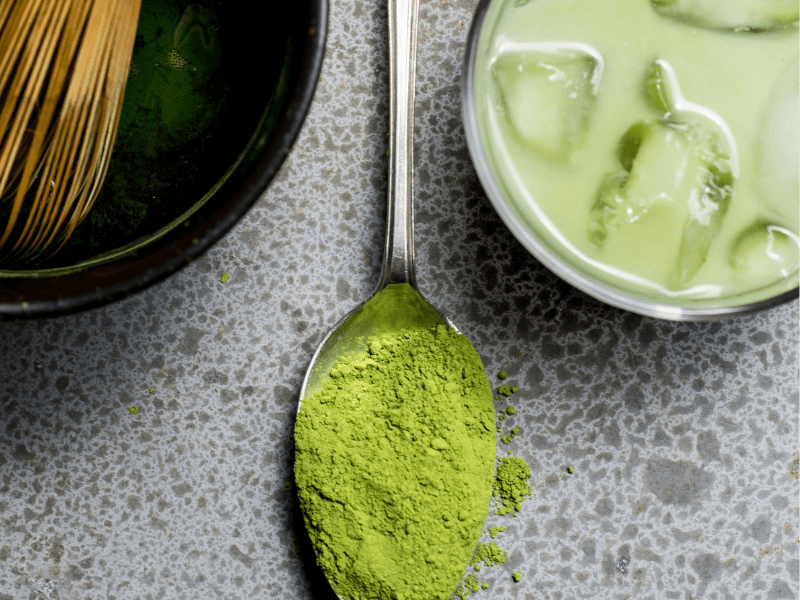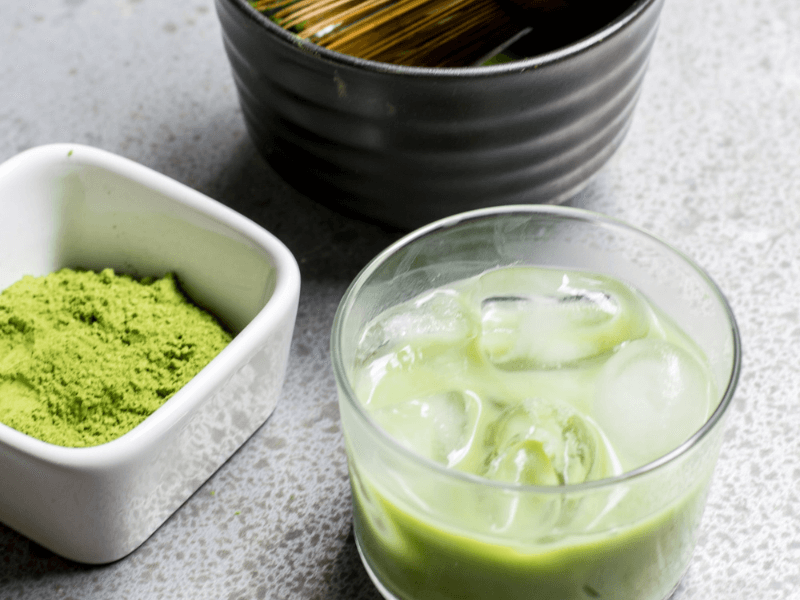
Matcha Tea Frequently Asked Questions: Your Comprehensive Guide to All Things Matcha
Matcha Unveiled: FAQs on Origins, Uses, and Health Benefits
Matcha tea, the vibrant green elixir that's taken the beverage world by storm, is much more than just a trend—it's a centuries-old tradition with a host of benefits. Whether you're a matcha enthusiast or a curious beginner, navigating the world of matcha can be a delightful yet puzzling journey. To quench your curiosity and provide you with the knowledge you seek, we've compiled a comprehensive guide that answers your most frequently asked questions about matcha tea. From its storied origins in Japan to its potential health perks and culinary uses, join us as we unravel the mysteries of matcha tea and deepen your appreciation for this remarkable drink.

1. What is matcha tea, and how is it made?
Matcha tea, often referred to simply as matcha, is a unique and vibrant green tea hailing from Japan. What sets matcha apart is the meticulous process of its cultivation and preparation. It begins with the tea plants, Camellia sinensis, being shaded from direct sunlight for up to three weeks before harvest. This shading enhances chlorophyll production, lending matcha its brilliant green color and boosting the amino acid L-theanine.
After handpicking, the tea leaves are swiftly steamed to prevent oxidation and preserve their vivid green hue. Next, they are meticulously dried and deveined, resulting in a product called "tencha." The tencha leaves are then ground into a fine powder using traditional stone mills, resulting in the vibrant green matcha powder we know today. The entire process is a harmonious blend of human precision and natural elegance, reflecting centuries of Japanese tea culture.
2. What are the health benefits of drinking matcha tea?
The health benefits of matcha tea are diverse and plentiful, making it a popular choice among health-conscious individuals. Matcha is revered for its potent antioxidant content, particularly the polyphenol EGCG (epigallocatechin gallate). EGCG is known for its potential in combating oxidative stress and inflammation, making matcha a formidable ally against various diseases.
Moreover, matcha provides a source of steady, sustained energy due to its balanced combination of caffeine and L-theanine. L-theanine promotes a calm alertness, mitigating the jitters often associated with caffeine. This unique blend of natural components fosters improved concentration and mental clarity. Matcha also supports weight management through its potential to boost metabolism and promote fat oxidation. Additionally, it provides vitamins (A, C, and E), minerals (potassium and iron), and dietary fiber. In essence, matcha isn't merely a tea; it's a holistic wellness elixir that caters to both the body and mind.
3. Is matcha tea high in caffeine?
Matcha does contain caffeine, but its caffeine content is relatively moderate compared to coffee. A typical serving of matcha, which equates to about 1 gram (roughly half a teaspoon), provides approximately 30-35 milligrams of caffeine. This caffeine dosage offers a gentle, sustained energy lift without the abrupt spikes and crashes associated with coffee. The magic of matcha, however, lies in its combination with L-theanine, an amino acid that promotes relaxation without drowsiness. This harmonious duo creates a state of alert calmness, rendering matcha a superior choice for those seeking a focused and jitter-free energy boost.
4. Does matcha tea aid in weight loss?
Yes, matcha tea can contribute to weight loss, although it's important to view it as a supportive element of a healthy lifestyle rather than a magical solution. Matcha's potential to assist in weight management comes from its ability to enhance metabolism and fat oxidation. Studies have suggested that the catechins in matcha, particularly EGCG, can increase the rate at which the body burns calories, potentially resulting in greater calorie expenditure.
Furthermore, matcha's unique combination of caffeine and L-theanine promotes mental alertness and focus, which can indirectly support weight loss efforts. It can help you stay motivated to engage in physical activity and make better dietary choices. However, remember that sustainable weight loss is a multifaceted journey that involves a balanced diet and regular exercise. Matcha can be a helpful companion in this process, but it should not replace healthy lifestyle choices.
5. Can matcha tea improve concentration and mental clarity?
Absolutely, one of the standout benefits of matcha is its potential to enhance concentration and mental clarity. This unique effect is primarily attributed to L-theanine, an amino acid found in matcha that promotes relaxation without causing drowsiness. L-theanine works synergistically with caffeine, promoting a state of focused alertness. Unlike coffee, which can lead to jitteriness and anxiety, matcha provides a balanced and steady energy boost.
Regular consumption of matcha can help improve cognitive function, memory retention, and overall mental well-being. It allows you to stay more present and attentive without the distracting ups and downs often associated with other caffeinated beverages. This makes matcha an excellent choice for activities requiring sustained focus, such as work, study, or creative endeavors.

6. How does matcha compare to green tea in terms of health benefits?
Matcha and green tea share the same origins—both are derived from the Camellia sinensis plant. However, their preparation methods and nutritional profiles differ significantly. The key distinction is that matcha is a powdered form of green tea, while traditional green tea is typically consumed in the form of brewed leaves.
Matcha is often considered more potent in terms of health benefits because you consume the whole tea leaf, which means you get a concentrated dose of its nutrients. Matcha's rich green color signifies its high chlorophyll content, indicating elevated levels of antioxidants. In contrast, when you brew green tea, you steep the leaves, and some of the valuable compounds may remain in the tea leaves or get discarded.
Both matcha and green tea offer various health benefits, including antioxidant properties, potential weight management support, and cognitive benefits. However, matcha's intensified concentration of these benefits can make it a preferred choice for those looking to maximize their tea's potential health impact.
7. Is matcha tea suitable for athletes?
Matcha tea has gained popularity among athletes and fitness enthusiasts for several reasons. Its unique blend of caffeine and L-theanine provides a steady source of energy, promoting endurance during workouts. Unlike many pre-workout supplements that may lead to jitters or crashes, matcha offers a sustained energy lift without disrupting focus.
Furthermore, matcha's potential to enhance metabolism and fat oxidation can be advantageous for athletes aiming to improve body composition and performance. Its rich antioxidant content can help combat oxidative stress caused by rigorous physical activity, supporting overall well-being.
Hydration is crucial for athletes, and matcha can be incorporated into their hydration routine. While not a replacement for water, matcha can be a hydrating beverage choice, offering not only fluid but also essential nutrients.
8. Does matcha tea contain calories or sugar?
Pure matcha tea contains no sugar and very few calories. A typical serving of matcha, about 1 gram, contains approximately 3 calories. This low-calorie content makes it an excellent choice for those looking to manage their calorie intake. However, it's essential to be mindful of added ingredients if you consume matcha in prepared beverages like matcha lattes. Sweeteners, milk, or flavored syrups can significantly increase the calorie and sugar content of your matcha drink.
To enjoy matcha in its healthiest form, consider preparing it traditionally with hot water or opting for unsweetened versions of matcha products. This allows you to savor the full flavor and benefits of matcha without the unwanted additives.
9. Can matcha tea help with skin health?
Matcha tea may offer benefits for skin health due to its high antioxidant content. Antioxidants combat free radicals, which can damage skin cells and accelerate aging. The polyphenols in matcha, particularly EGCG, have been studied for their potential in protecting the skin from UV damage and improving skin elasticity.
Moreover, matcha's potential to reduce inflammation and oxidative stress can contribute to clearer and healthier skin. It's important to note that while matcha can be a valuable addition to your skincare regimen, it should complement other skincare practices, such as sun protection and a balanced diet, for optimal results.
10. Is matcha tea suitable for children or pregnant women?
Matcha tea is generally considered safe for consumption by children and pregnant women when consumed in moderation. However, due to its caffeine content, it's crucial to be mindful of serving sizes. Excessive caffeine intake during pregnancy can have adverse effects, so it's advisable for pregnant women to consult with a healthcare professional to determine a suitable caffeine limit.
For children, matcha can be introduced gradually, starting with smaller servings and monitoring their response to caffeine. Additionally, matcha lattes or matcha-flavored sweets may contain added sugar, so it's wise to be cautious about sugar intake, especially for children.
In summary, while matcha can be enjoyed by a broad audience, it's essential to be aware of caffeine and potential additives, particularly for vulnerable populations like pregnant women and children.

11. Can matcha tea be enjoyed as an alternative to coffee?
Yes, many people opt for matcha as a coffee alternative due to its unique qualities. While both matcha and coffee provide caffeine, matcha offers a more balanced and sustained energy boost without the jitteriness or crashes often associated with coffee. Matcha's combination of caffeine and L-theanine promotes alertness and focus without the overstimulation that coffee can sometimes induce.
Additionally, matcha's rich, earthy flavor can be an acquired taste for those seeking an alternative to coffee's boldness. Matcha can be incorporated into various recipes, such as matcha lattes, smoothies, and baked goods, providing a versatile and enjoyable way to reduce coffee intake while reaping its potential health benefits.
12. Can matcha tea help with stress and relaxation?
Yes, matcha can play a role in stress management and relaxation. L-theanine, a unique amino acid found abundantly in matcha, has been linked to relaxation without causing drowsiness. It helps in reducing stress and anxiety by promoting the production of calming neurotransmitters, such as dopamine and serotonin.
Matcha's combination of caffeine and L-theanine creates a state of focused calmness, making it an excellent choice for those seeking relaxation without sacrificing alertness. The ritual of preparing and savoring a cup of matcha can also be a mindful practice, contributing to stress reduction.
For relaxation, consider drinking a warm cup of matcha tea before meditation, yoga, or any other calming activity. Its soothing properties can enhance your overall sense of well-being.
13. Can matcha tea support immune health?
Matcha tea contains various compounds that can contribute to immune health. One of its key components, epigallocatechin gallate (EGCG), is known for its antioxidant and anti-inflammatory properties, which can help protect the body from infections and illnesses.
Additionally, matcha contains vitamins and minerals, including vitamins A and C, which play essential roles in maintaining a robust immune system. Matcha's potential to reduce oxidative stress and inflammation can further support immune function.
Incorporating matcha into your diet as part of a balanced and nutrient-rich lifestyle can be a valuable step toward enhancing overall immune health.
14. Is matcha tea suitable for individuals with dietary restrictions?
Matcha tea is naturally gluten-free and suitable for individuals with celiac disease or gluten sensitivities. It is also vegan, as it contains no animal products. However, as mentioned earlier, it's essential to check the ingredients when consuming matcha-flavored products, as additives or sweeteners could affect dietary suitability.
Additionally, matcha can be incorporated into various dietary plans, such as vegetarian, vegan, paleo, or ketogenic diets. Its versatility makes it a suitable beverage choice for individuals with different dietary restrictions.
15. Can matcha tea be part of a weight loss plan?
Matcha can be a valuable component of a weight loss plan due to its potential to boost metabolism and fat oxidation. The catechins, particularly EGCG, found in matcha are believed to enhance calorie burning, making it an excellent choice for individuals looking to manage their weight.
When incorporating matcha into a weight loss plan, it's important to be mindful of overall calorie intake and to use matcha as a complement to a balanced diet and regular physical activity. Drinking matcha alone is unlikely to produce significant weight loss results, but it can support your efforts when combined with a healthy lifestyle.












































